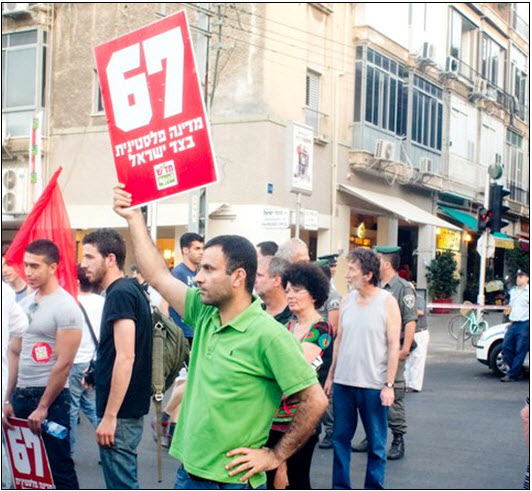In principle, a small majority of Palestinians (51%) and Israelis (58.5%) support a two-state solution to the Israeli-Palestinian conflict. So reports the new Palestinian-Israeli Pulse: A Joint Poll published on Monday, August 22, by the Israel Democracy Institute and the Palestinian Center for Policy and Survey Research in Ramallah. The poll, which surveyed 1,270 Palestinians and 1,184 Israelis, focused on the public’s views on a permanent peace agreement, the ability to trust and compromise with the other side, and mistrust and fear of the other.
However, when presented with a peace agreement package based on the previous rounds of negotiations, only 39% of Palestinians and 46% of Israelis responded that they are in favor. This package includes a de-militarized Palestinian state, Israeli withdrawal to the Green Line (pre-June 1967 borers) with equal territorial exchanges as relevant, family unification in Israel for 100,000 Palestinian refugees, West Jerusalem as the capital of Israel and East Jerusalem as the capital of Palestine (with the Jewish Quarter of the Old City and the Western Wall under Israeli sovereignty and the Muslim and Christian Quarters and the Temple Mount/al-Haram al Sharif under Palestinian sovereignty), and an end to the conflict and mutual claims.
Support for this nine-point peace package is higher among secular Israeli Jews (56%), compared to traditionalists (35%), religious (10%) and ultra-Orthodox (9%). Similarly, more Palestinians who define themselves as “not religious” (63%) or “somewhat religious” (41%) support the peace agreement package, compared to those who define themselves as religious (35%). Support among Israelis who define themselves as left and moderate left is highest (84%) compared those place themselves politically in the center (59%) or right and moderate right (18%). On the Palestinian side, some 57% of Fatah voters support this package, compared to 25% of Hamas voters and 46% of voters for other factions. Significantly, one-quarter of Palestinians and Israelis who opposed the peace agreement package said they would change their minds and support the package if the agreement includes a wider or regional Arab-Israeli peace.
When asked why they believe previous rounds of negotiations failed, a majority of Palestinians (62%) blame the Israelis, while a majority of Israeli Jews (52%) blame the Palestinians. Likewise, only 43% of Palestinians and 43% of Israelis believe the other side wants peace.
Joint List leader MK Ayman Odeh (Hadash) responded to the poll, saying that it shows that a majority of Israelis and Palestinians support a two-state solution, proving that peace is possible. Odeh slammed the far-right Israeli government for what he calls its rejectionist stance. “The results of the survey show that even though the Israeli government is trying to create total despair about the possibility of reaching a political agreement, the majority of Israelis and Palestinians still support a peace deal and a two-state solution,” Odeh said.
“Furthermore, this survey again shatters the notion that there is no [Palestinian] partner, and shows that despite fifty years of brutal occupation, most Palestinians still support a peace agreement with Israel,” he added. “The entire world already supports the establishment of a Palestinian state within the 1967 borders, with the exception of the government of Israel, which will become a pariah in the world as a result of its rejectionist positions.”



